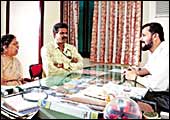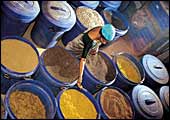|
One
day in December, S.B. Vimala, a 62-year-old teacher arrives at the
Arya Vaidya Pharmacy's (AVP) four-acre campus in Coimbatore for
a follow-up consultation with her doctor, K.G. Raveendran. Her walk
is steady and although she slurs a bit while talking, it is difficult
to imagine that this is the same person who first came to AVP in
a wheelchair, unable to move, talk, even eat, and incontinent. That
was in April this year; in February, Vimala suffered a brain haemorrhage
and collapsed; she spent a month in a hospital that ensured she
was alive (and only just). By June, however, the lady, a diabetic
who suffers from hypertension, was on her feet again.
Not very far from where Vimala is meeting with
Raveendran, a ritual is in progress to propitiate Dhanvantari, the
Hindu God of healing. This is a fire-ritual, where offerings are
made to the concerned God or Goddess in the name of Swaha, the wife
of the fire-God Agni; Namboodri priests from Kerala are feeding
the fire with 108 herbs, and patients sit around inhaling the aromatic,
medicinal smoke and listening to the chanting.
It's hard to associate a scientist like P.
Ram Manohar with a milieu that seemingly involves miracle cures
and magical rituals. Conversely, the very fact that AVP boasts a
Head of Research would seem to indicate that the cures are far from
miracles, and the rituals, not a bit magical. And Manohar is involved
in a project that, if successful, could take ayurveda and AVP, not
necessarily in that order, global. The specifics: a grant (of a
mere Rs 1.2 crore; then, it is a start) from the US' National Institutes
of Health (NIH) to develop long-term collaborations between researchers
at AVP and those at top American universities such as John Hopkins.
It is Ram Manohar's view that the US can no longer afford to ignore
ayurveda; he claims 45 per cent of the medicines sold in the US
fall under the "alternate medicine" category. And nothing
is really as alternative as ayurveda.
 |
| Do inhale: Herbs
being fed to the fire during Dhanvantari Homam
|
An Ayurvedic Renaissance
It doesn't involve bloodletting. Nor does it
leeches. Yet, ayurveda, the traditional Indian system of medicine,
has never gained the First World's acceptance. Part of this has
to do with issues related to the industry's fragmented nature in
India, issues such as documentation, standardisation and safety.
Mired in these problems, miracles (not certified, though) have gone
unnoticed. In Kerala, the southern Indian state renowned for its
ayurvedic treatments, there are hospitals that have made a name
for identifying and treating snakebites (far faster than any known
allopathic methods), and those that have a far better record than
better-known names at curing people of fairly serious eye diseases
such as glaucoma. AVP, stresses its current head P.R. Krishna Kumar-he
is the son of the pharmacy's founder P.V. Rama Variar and the largest
shareholder in the company-has "now got an opportunity to change
this".
Krishna Kumar is a pious-looking 53-year-old
who usually dresses in white and sports a vermillion mark on his
forehead. His words hint at the larger purpose behind the study,
the revival of ayurveda itself.
|
|
 |
| The men on a mission and the beneficiary:
(Above) Arya Vaidya Pharmacy's Head P.R. Krishna Kumar (left)
with Head of Research Ram Manohar; (Right) AVP physician K.G.
Raveendran (far right) with S.B. Vimala (L), who has made a
seemingly miraculous recovery from a brain haemorrhage |
 |
As would merit an exercise of this magnitude,
the study involves research along three dimensions: literary (locating,
studying and cataloguing books on the subject); field (documenting
living traditions and traditional practices); and experimental.
And that's in the first phase. Krishna Kumar is expecting a second
grant from NIH that will help the cause of scalability; he expects
India's Ayurveda Inc. to be part of this. "It (the industry)
has already realised the importance of this grant," says Krishna
Kumar. "The Kerala (based) companies have formed a cluster
for joint co-operation." Kerala, of course, is the fount of
ayurveda. Of the 900 companies into the business in the state, three
or four do business worth a few hundred crore rupees every year.
Yet, experts such as Ram Manohar believe that 95 per cent of ayurveda's
secrets are lost to us for ever.
< |
